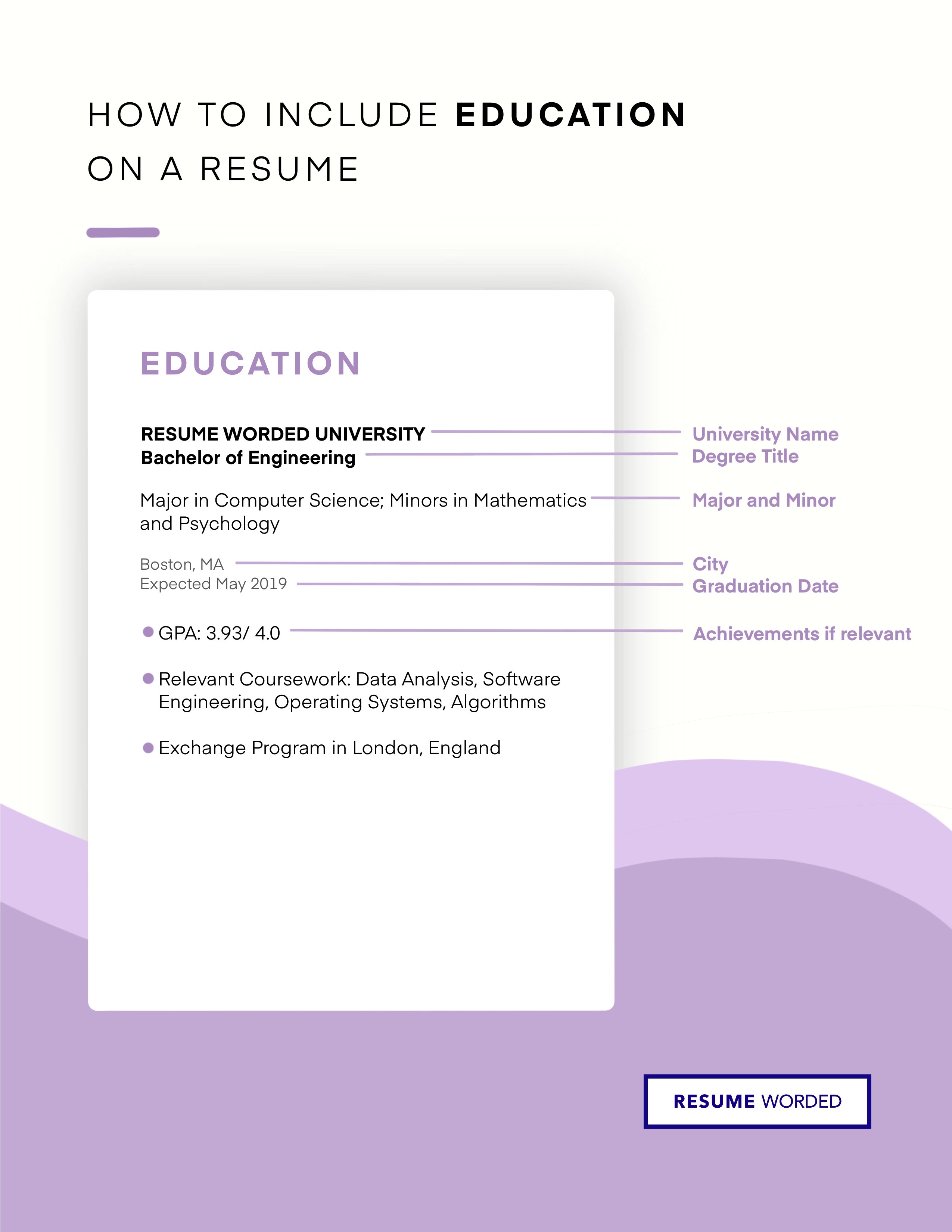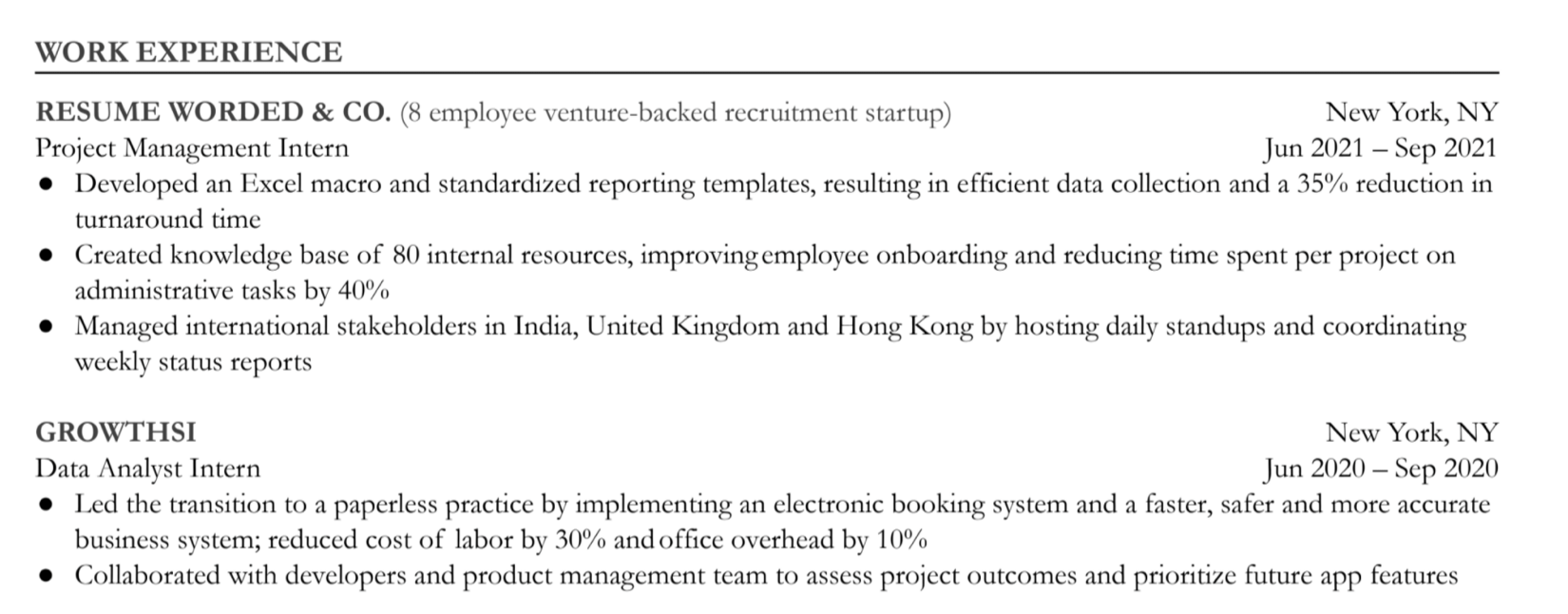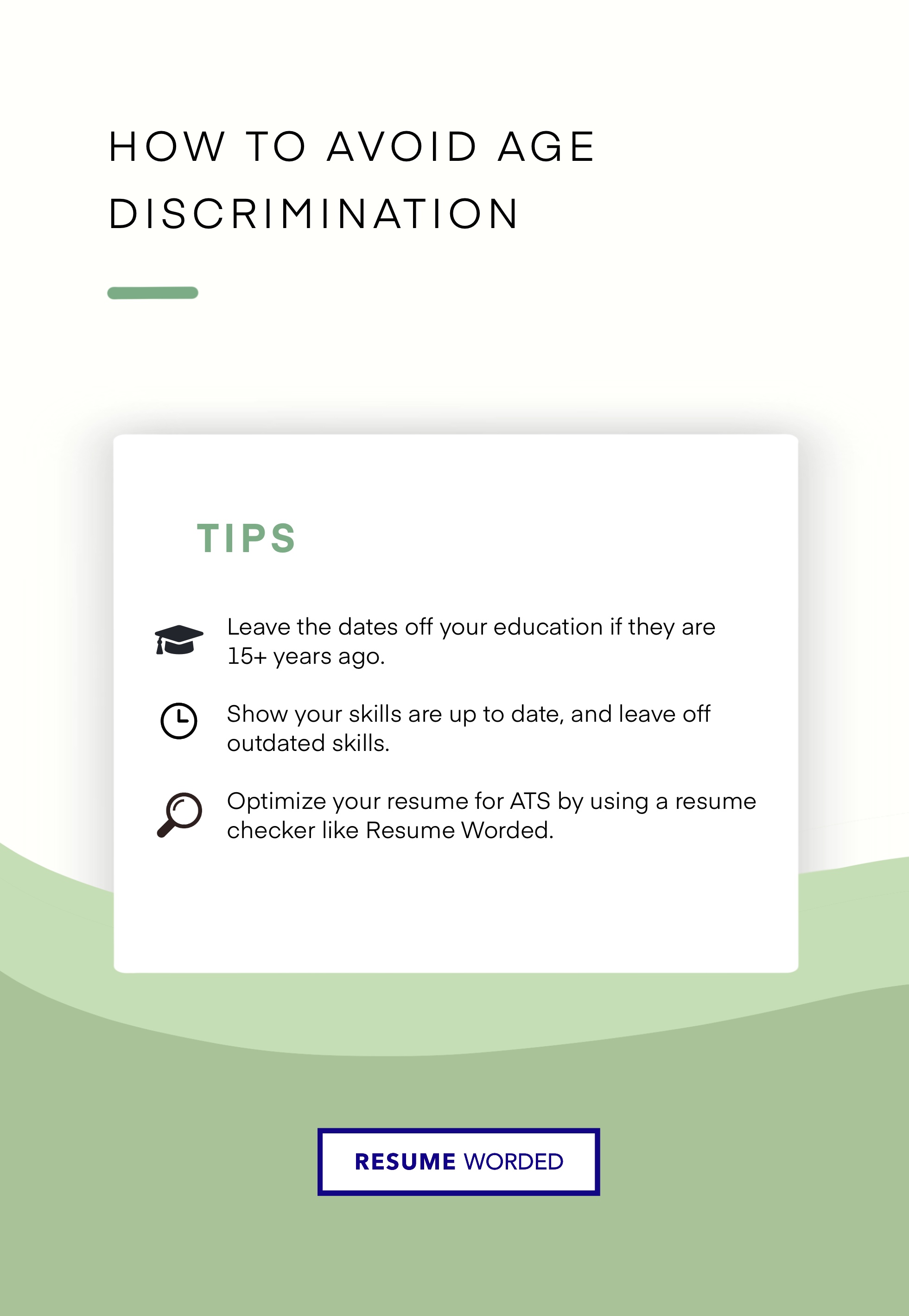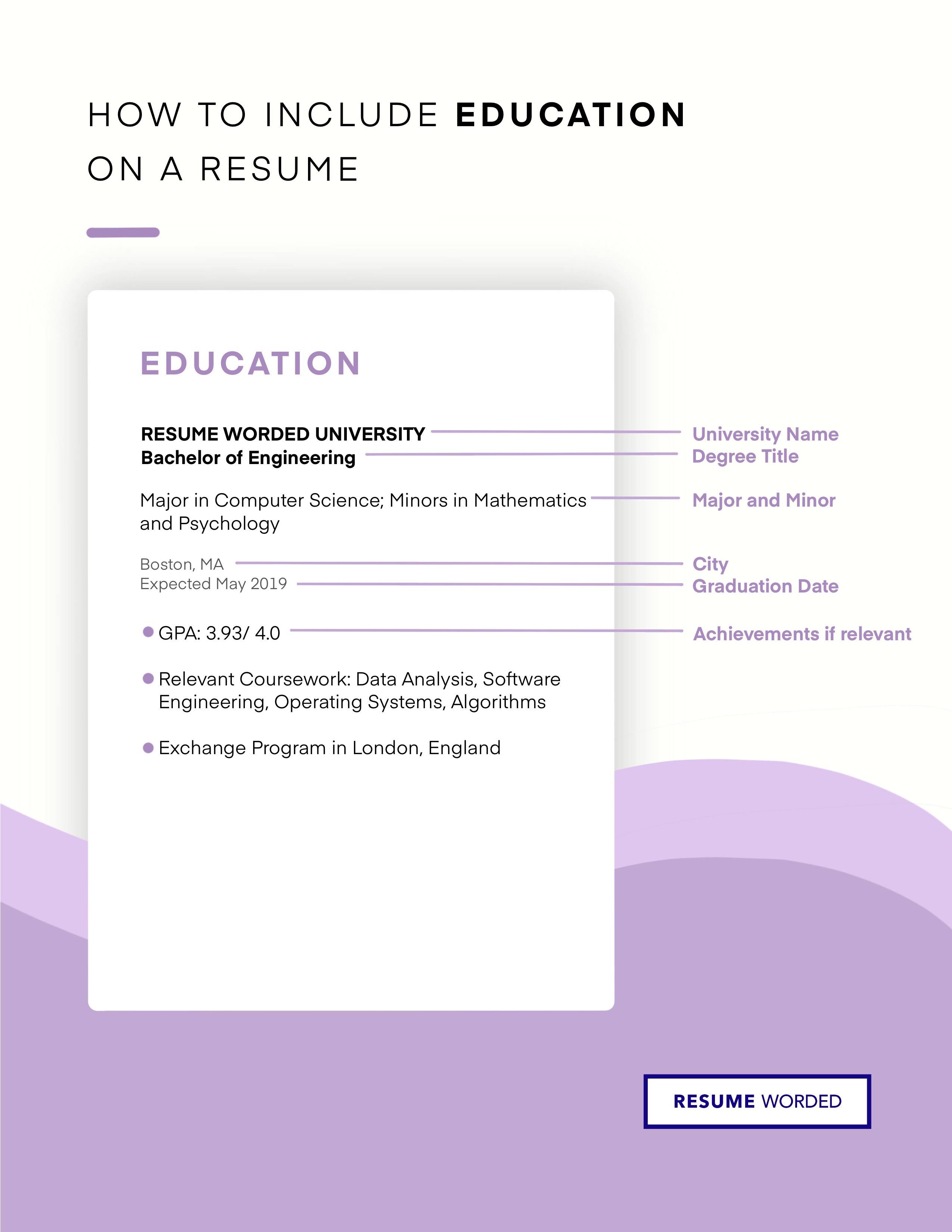The education section is an easily overlooked part of any resume — which doesn’t mean it should be an afterthought. If you’re a current student or recent graduate, or if you’re applying to jobs that require a specific degree, you’ll know you need to put some thought into it, but the same is true even if you’ve been in the workforce for a while.
Here are some of our best tips for how to structure it, including where to put your resume education section and how to make the most impact without letting it take over more space than it needs.
Where to put your education on your resume
Where to put the education section of your resume mostly depends on how recently you graduated:
- If you've been out of school for a few years and have some relevant work experience, include your education section underneath your professional experience.
- If you graduated recently and your education is your most relevant experience, put your education section at the top of your resume.
We'll go into more detail on the why's and how's of listing your education vs work experience first on your resume later in the article. First, here's a quick guide on how to write a resume education section.
How to format a resume education section
- Create a separate section and title it "Education."
- List the name of the school and the degree you studied.
- List your graduation date. This is optional, especially if you graduated more than 10 years ago.
- List any major awards or honors, including cum laude or dean's list.
- If you're a current student or recent graduate, you can consider including extra details like GPA or relevant coursework (see below for more details).
- If you have multiple degrees, list them in reverse chronological order, with your most recent degree first.

Resume education section template
Here are a couple of different templates you can use, depending on how much experience you have.
Education section for mid-level hires
Here's an example of a brief education section, suitable for experienced hires.

Use this template to copy this format:
EDUCATION
Name of college or university, location
Date of graduation
Degree, major, and minor
Education section for students and graduates
This is a longer example you can use if you're a current student or recent graduate.

Here's the expanded template:
EDUCATION
Name of college or university, location
Date of graduation
Degree, major, and minor
Awards and GPA (if above 3.5)
Relevant coursework
What to include in your resume education section
As a general rule, you should limit your education section to information that's relevant to the job you're applying for.
Must haves:
- The university or college you attended
- The degree you obtained
- Your major(s)
Optional:
- The year you graduated
- Minor(s)
- Awards and honors
- GPA
- Study abroad
- Relevant coursework
- Extracurricular activities
- Other certifications
- Educational projects
- Internships and student placements
- Unfinished degrees
The university or college and degree
This one's a no-brainer. If nothing else, you must include the name of your degree and where you obtained it.
Example:

Major and minor
You should pretty much always list your major, unless you completed your degree in a completely unrelated field. Listing your minor is a good idea if it's in any way relevant to the job you're now applying for.
Example:

More information: How to put a double major on a resume and the minors you need to include on your resume
Awards and honors
Any major awards or honors should go in your resume education section. These include cum laude or magna cum laude, dean's list, and fellowships.
Example:
More information: How to list honors on your resume
GPA
Your GPA is very optional — only include it if you're a current student or recent graduate and it's above 3.5. In all other cases, leave it off.
Example:

Study abroad
If you’re a current student, it’s fine to list study abroad on your resume. You can list the experience under the host school, making sure to note that it was a study abroad program.
Example:

More information: Turn study abroad into a job with these resume tips
Coursework
If you're an experienced hire, skip this step. If you have real work experience, including coursework will look strangely out of touch.
If you're a current student and don't have a lot of relevant work experience, relevant coursework can help demonstrate key skills and get you past Applicant Tracking Systems. You can list a handful of subjects on one line underneath your degree and major.
Example:

More information: What to put on your resume if you don't have a lot of experience
Extracurricular activities
You can include student activities a subsection of your resume education section (if they only take up a line or two) or in a separate section (if you want to include key accomplishments).
Example:

More information: How to showcase extracurriculars on your resume
Other certifications
Other certifications and qualifications can go on your resume, but be critical about what you list. This could include certificates, licences, technical qualifications, and other types of continuing education — as long as they’re relevant to the job you’re applying for. You also don’t need to list every conference or seminar you’ve ever attended. Keep it limited to substantial qualifications that help you stand out.
Example:

More information: The right way to list certifications on a resume
Educational projects
Projects can also be listed in their own section if you choose to elaborate on your accomplishments — if you're a current student or recent graduate, this is a great way to highlight relevant skills. If you'd rather keep it brief, include a 'Projects' subheading in your education section and list them there instead.
Example:

More information: How to list projects on your resume
Internships and student placements
Internships — paid or unpaid — are generally a better fit for your work experience section, since they take place in a professional work environment. List these the same way as paid work experience, including the name of the employer, the dates of the internship, and a few key accomplishments in bullet points.
You can include student placements if they were a) significant, b) recent, and c) relevant. In other words, a six-month hospital placement belongs on your resume if you're a recent nursing graduate, but a two-week observation probably doesn't.
Example:

More information: How to write effective resume bullet points
Unfinished degrees
It's fine to list an unfinished degree on your resume. Do list an unfinished degree if it's relevant to the job you're applying for, demonstrates key skills, or explains a long career gap. Don't list an unfinished degree if it's much older or in a different industry than the one you now work in — only include it if it strengthens your candidacy.
It’s also okay to include your degree if you haven’t officially graduated yet — simply list it as “expected May 2025” (or whatever date applies).
Example:
Boston University (2020-2021)
Boston, MA
Bachelor of Arts in Communication — Completed 20 credit hours
More information: Listing an unfinished degree on your resume
I’d recommend uploading your resume to the tool below to find out if your education section is structured the right way. It’ll scan your education section and let you know if you’ve listed your degrees, majors & minors, GPA, honors, coursework and projects the right way. It’ll also let you know which of these belong on your resume and which ones to leave off entirely.
Do's and don'ts for structuring your education section
Here are some general do's and don'ts for formatting the education section of your resume:
Do:
- Keep it brief. In most cases, your education section only needs to be a line or two underneath your work experience.
- Highlight any particularly impressive accomplishments, like graduating summa cum laude or receiving a prestigious fellowship.
- Include unfinished degrees if you're still in school or they're relevant to the job you're applying for.
- List all your degrees, not just the most recent. You may think your bachelor’s degree in art history doesn’t matter if you have a master’s in engineering and are applying for jobs as an engineer, but it’ll look weird if you leave it off altogether.
- Leave a degree off your resume only if it isn’t relevant and it could make you appear overqualified — for example, if you have PhD in mathematics and are applying for jobs as an entry-level salesperson.
- Always include an education section, even if it's very short.
Don't:
- Include more information than is necessary. Stick to details that strengthen your candidacy — if it's not relevant, leave it off.
- Include your GPA unless it's very high (above 3.5). Listing a 2.0 GPA isn't going to impress any recruiters — but the good news is, once you've graduated, it isn't relevant anyway.
- List high school information (unless you're a current high school student).
Tips for writing a resume education section
Wondering how these rules apply to your specific circumstances? Here's some more targeted advice for different situations.
If you’re a recent graduate
As a recent graduate, always include your graduation date on your resume. If you don’t have a lot of work experience, a recent graduation date makes it obvious why.
Unlike more experienced hires, recent graduates can use your education section to highlight your achievements. This includes awards, student initiatives, study abroad programs, language proficiency, key leadership skills, and any major accomplishments.
If you’re a current student
If you’re still studying, your education section can be a lot bigger, since you’re unlikely to have a lot of relevant work experience. You should include any major accomplishments, including awards and involvement in extracurricular activities. If you know when you’ll be graduating, go ahead and list the expected date.
Any part-time work experience or internships can go in the work history section of your resume.
If you graduated a while ago
Try to keep your education section as short as possible. The longer you’ve been in the workforce, the shorter it should be. If you graduated some time ago (e.g. 8+ years), it’s common practice to omit the date (and a good idea for those who want to avoid any potential age discrimination).

If you transferred schools
If you started and finished your degree at different institutions — including transferring between four-year schools or from a community college — it's fine to just list the name of the school you graduated from. If you're a recent graduate and have achievements on your resume from your previous institution (like involvement in student organizations), you can consider listing both schools for clarification.
If you have multiple degrees
If you have multiple degrees, list them in reverse chronological order with the most recent first.
Key takeaways
Remember that your resume is about presenting you as a strong applicant for a position rather than about adding as much information as possible. Normal resume rules apply — if it strengthens your candidacy, leave it in. If it takes the spotlight off more impressive work experience, take it off.
Everything on your resume should have a single purpose: Demonstrating that you’re a good fit for the position you’re applying to. This means:
- Tailor your resume: Add or remove experiences and qualifications from your experience section as necessary to fit each specific role.
- If you don't have much work experience: Expand your education section when you don’t have a lot of work experience, or if the experience you do have isn’t particularly relevant. On the other side, if your work experience is extensive or impressive on its own, anything else you add risks taking focus away from the parts you want to highlight.
- If you’re a career changer: Fresh qualifications can help bridge the gap between your old industry and the new role you want.
Should you lead with work experience or education on your resume?
The convention is for your education section to be after your work experience, but there are some situations where that doesn’t apply.
You can put your education section at the top of your resume if:
- You're still a student
- You graduated recently
- You're changing careers
AND
- Your education is the most relevant part of your resume
Recent or current students can lead with your education section
If you’re a current student and don’t have a lot of work experience, it’s fine to lead with your education section. It’s the most recent (and likely most relevant) experience you have. Leading with your education also prevents anyone who’s skimming over your resume from assuming that you’re simply inexperienced or unemployed, when the reality is that you’re in full-time education.
The same applies if you’re a recent graduate. If your education is still the most relevant or most impressive experience you have, list it first.
Career changers can start their resumes with an education section, if it's relevant
The last exception is career changers. If you’ve gone back to school as part of the career change process, you can list your education first. A new qualification is more relevant than your experience in a different industry. It also provides important context for your application, as a resume that solely focuses on your past experience in a different sector might otherwise be confusing to a hiring manager.
If you’re a career changer looking for new qualifications to include in your education section but aren’t sure what skills you need, use the tool below to find a list of skills and keywords required for the job you want.
Otherwise, your work experience should come before your education section
If the situations above don’t apply to you, and you don’t have another good reason to list your education first, stick to the standard convention as lead with your work experience. Employers primarily want to know about your work history and achievements, so unless your education is very recent, you’re better of focusing on your professional accomplishments.










